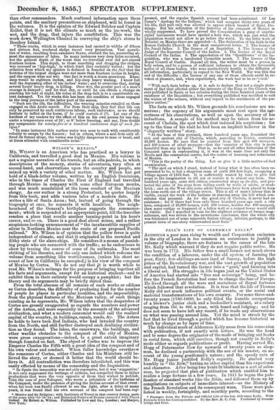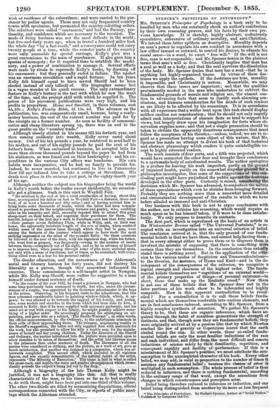FELL'S LIFE OF ALDERMAN KELLY. * ALTHOUGH a poor man rising
to wealth and Corporation eminence in the city of London is too common an occurrence to justify a volume of biography, there are features in the career of the late Mr. Kelly which warrant if they do not require public notice. He
was born in 1772. His father was a small farmer not much above the condition of a labourer, under the old system of farming the poor, flinty, few-shillings-an-acre land of Surrey, before the high prices of the Revolutionary war, and the vast growth of population and capital, had turned the farmer into a "gent," and farming into
a liberal art. His struggles in life began just as the United States of America had started into "free and sovereign" being, and be- fore the French Revolution had come to change the face of Europe. He lived through all the wars and mutations of Royal fortunes which followed that revolution. It is true that the life of Thomas Kelly did not much influence political events, or the social and material transformations of his own country. For some three-and- twenty years (1788-1809) he only filled the humble occupations of a brewer's junior clerk and a bookseller's assistant, at a salary ranging from 10/. to 801. a year, with board and lodging; and he does not seem to have left any record, if he made any observations on what was passing around him. Yet the mind is struck by the fact that he lived through a period which has become historical as much by change as by lapse of time. The individual mark of Alderman Kelly arose from his connexion with publication, if not exactly with letters. He was the head and to some degree the originator of the mode of bringing out books in serial form, which still survives, though not exactly in Kelly's mode either as regards publications or profit. Having served Mr. Hogg of Paternoster Row for upwards of twenty years as shop- man, he declined a partnership with the son of his master, on ac- count of the young gentleman's nature ; and the speedy ruin of Mr. Hogg junior Justified Kelly's sagacity. He tarted very humbly in "the Row," having ;mother capital than his experience and character. After being two irettile&Ibliriiis as a sort of sales- man, he projected that plan of publication which enabled him to realize a large fortune in a few years. In 1811 he began the pub- lication of standard works like the Bible, and followed them up by compilations on subjects of immediate interest—as the History of the French Revolution and its consequent wars. These were pub- lished in weekly, fortnightly, and monthly parts, according to the • Passages from the Private and 0111c4a1 Life of the late Alderman Kelly, Witk Extracts from bis Correspondence. By the Rev. B. C. Fell. Published by Croon. bridge and Sons. wish or residence of the subscribers; and were carried to the pur- chaser by pedlar agents. These men not only frequented country towns with specimens but permeated the country soliciting orders. The solicitors were called "canvassers," and had the fluency, per- tinacity, and confidence which are necessary to the vocation. The mode of doing business was not the most delicate in the world ; but five.and-forty years ago, when to travel a hundred miles took the whole day "by a fast coach," and a conveyance could not carry twenty people at a time, while the remoter parts of the country were only accessible by special carriage, Kelly's plan was a great convenience to the mass of purchasers. It also gave him a species of monopoly; for it required time to establish the machi- nery, and a power of combination to manage it. Several efforts were made by rivals to supersede Kelly's books, by drawing off his canvassers ; but they generally ended in failure. The upshot was an enormous circulation and a rapid fortune. In ten years Kelly felt himself equal to have served Sheriff had he been elected instead of only talked] of. His biographer seems lost in a vague wonder at his quick success. The only extraordinary feature in Kelly's history is the tact with which he saw the want of the time, and the prompt skill with which he supplied it. The prices of his piecemeal publications were very high, and his profits in proportion. Hume and Smollett, in three volumes, cost 41.10s. ; Kelly's Family Bible, Si. lbs. 4d. The advance on the publication, too, was comparatively small, because, being a ready- money business, the cost of the current number was paid for by the receipts on a former number. As soon as facility of communi- cation and cheap literature sprang up, there was an end to the great profits on the "number trade."
Although closely stinted in his means till his fortieth year, and then coming suddenly into wealth, Kelly never cared about money. Out of his ten pounds a year, he contrived to send half to his mother, and out of his eighty pounds he paid the rent of his father's farm. When embarked in business, he accepted bills for more than eleven thousand pounds beyond the paper he had from his stationers, as was found out on their bankruptcy ; and his ex- penditure in the various City offices was handsome. His own habits were inexpensive, and he had no family to provide for. Indeed, he never married, but continued to live in Paternoster Row till age induced him to take a cottage at Streatham. His death took place in the autumn just past, in the eighty-fourth year of his age.
Although neither the subject nor his biographer bring the world in Kelly's youth before the reader except incidentally, we occasion- ally get a glimpse. Such is this visit to Weyhill Fair.
"He retained to the end of life a vivid recollection of having, about this time, accompanied his father on foot to Weyhill Fair—a distance, there and back, of at least a hundred and fifty miles—and of having assisted him to bring home some thousands of lambs, which the latter had been commis- sioned to purchase for the neighbouring farmers and gentry, who' confiding alike in his integrity and skill, annually deputed him to attend this great sheep-mart on their behalf, and negotiate their purchases for them. The terrible fatigue of the first day's walk to Farnham—not less than forty miles —their passage across Salisbury Plain, while in Wilts, and, on their way home, the apparently indefinite length of the row of lambs, when confined within some of the narrow lanes through which they had to pass, were among the features of the journey which appear to have made the most striking impression on the mind of the younger Kelly. On these occasions he followed in the rear of the dock, with his sagacious dog, while his father, who wont first as pioneer, was frequently—owing to the number of lambs between them—completely out of his sight, and so far in advance of himself as to impress him, when passing through some of ithe more secluded spots, not only with a sense of loneliness, but at times, as he remarked, with some- thing allied even to a fear for his personal safety."
The slender education, and the narrowness of the Alderman's social and literary horizon for forty years, did not destroy his liberality as a patron, though they somewhat influenced its exercise. These commissions to a self-taught artist in Newgate, while Mr. Kelly was Sheriff, were rather too suggestive to a man himself under formal sentence of death.
"In the course of the year 1825, he found a prisoner in Newgate, who had some time previously been sentenced to death, but who, under the circum- stances of a respite, was appointed by the Governor schoolmaster to the boys in the prison. Observing, in his frequent visits to the schoolroom, that this man possessed considerable talent in painting window-blinds, which, it ap- pears, he was allowed to do towards the support of his family, and seeing, also, some models and sketches in the room which had been done by him, it occurred to Kelly, that if he were supplied with necessary materials, and his mind set at rest with respect to his family, he might possibly achieve some- thing of a higher order. He accordingly _proposed his attempting an oil- painting, and gave him as a subject, The Death-Warrant' ; in other words, the official announcement, by the Ordinary, to the unfortunate criminals in their cells of their approaching doom. The prisoner, acquiescing readily in the Sheriff's suggestion, the latter not only supplied' him with materials for the work, but also promised to allow his wife a weekly suns for the mainte- nance of herself and her young children, Under the direction of the Sheriff and Ordinary, the parties introduced into the picture were prevailed upon to allow sketches to be taken of themselves; and the artist had likewise access to the prisoners then under sentence of death. The likenesses of all the parties were considered so striking, and the picture, as a work of art, gave so much satisfaction, that another was designed as a companion, which was af- terwards completed. This second effort, which included in all eighteen figures, and was equally demonstrative of the natural talent of the artist, represents 'The Morning of Execution.' The scene is laid in what is called the press-yard, and depicts the stern and, sombre circumstances which 'imme- diately precede the culprit's being led out to the drop.'_'
Although a biography of the late Thomas Kelly might be justified, it was not a biography like this. All that is really characteristic of the man, or his times so far as he had anything to do with them might have been put into one-third of this volume. The other two-thirds are filled by sermonizing disquisitions, official correspondence connected with the City, or reports of public meet- ings which the Alderman attended.



































 Previous page
Previous page